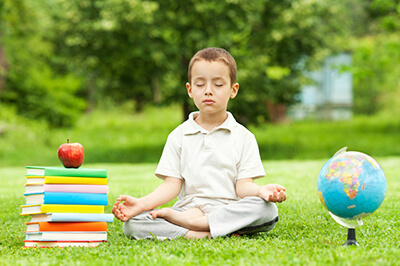
Mindfulness in School
When the Specials classes began last fall, and for the duration of this school year, the E1 students in Ms. Wisley’s class participated in a 45 minute weekly class on the subject of Social and Emotional Learning, titled Social Problem Solving. To start mindfulness in school the focus of the class was on increasing awareness of self and others, and on gaining the skills of self regulation, management of feelings, and relationship building. The specific topics covered in the experiential class were feelings awareness, following directions, active listening, communication styles and skills, body language, physiological signs of stress (flight or fight response), breathing, progressive relaxation and other techniques for stress management, the steps of conflict resolution, and empathy.
The feedback from students was very positive about the class, and each week the initial class time was set aside for students to report on how they had practiced what they had learned in the previous class. By the end of the school year, there appeared to be a reduction in the amount, intensity and duration of interpersonal conflict between students, and an increase in group cohesion and a sense of community in the class. Many students also reported having successfully practiced the techniques at home, whether to cope with stressful situations or in dealing with sibling conflicts.
The plan for next year will be to continue these classes. One second grade student asked this week whether the topics for next year’s class will be the same or different than what they were taught this year, and stated she was looking forward to them already.
In the 2015-2016 school year, we will introduce the practice of Mindfulness to Mission. Mindfulness is defined as a particular way of paying attention by purposefully bringing awareness to one’s experience. Mindfulness can be applied to sensory experience, thoughts, and emotions by using sustained attention and noticing our experience without reacting. These are some of the evidence-based benefits of mindfulness:
Better focus and concentration
Increased sense of calm
Decreased stress & anxiety
Enhanced health
Improved impulse control
Increased self-awareness
Skillful responses to difficult emotions
Increased empathy and understanding of others
Development of natural conflict resolution skills
The Mindfulness Fundamentals and Curriculum Training courses will be taken this summer by Amy Malone through the Mindful Schools program. Mindful Schools is one of the leading organizations in the U.S. integrating mindfulness into education and youth mental health. Mindful Schools has provided online and in-person training to thousands of educators and mental health professionals across all 50 U.S. states and 60 plus countries, impacting approximately 250,000 youth globally to date. Dr. Jon Kabat-Zinn, founder of Mindfulness-Based Stress Reduction (MBSR) and Mindful Schools Advisor, stated: ‘Now there is a large and growing grassroots movement promoting mindfulness in primary and secondary education, and Mindful Schools is at the cutting edge of training educators to effectively integrate mindfulness practices and perspectives into their classrooms.’
A kindergarten teacher reported on her experience in bringing mindfulness to her classroom this way: “Mindfulness opens the mind to noticing, without judgment, how you feel, think, and interact with the world. My students have become grounded in a way I have never seen before. Their empathy for each other, kindness toward their world, and ability to focus is rarely seen in kindergarteners; but as we continue our mindful practice, these qualities grow more and more concrete.”
Research Study Summary
Mindfulness has been extensively researched and found to be effective across a wide range of populations. In the 2011-12 school year, Mindful Schools partnered with the University of California, Davis to conduct the largest randomized-controlled study to date on mindfulness and children, involving 937 children and 47 teachers in 3 Oakland public elementary schools.
The Mindful Schools curriculum (which is taught to educators through their Curriculum Training) produced statistically significant improvements in behavior versus the control group with just 4 hours of mindfulness instruction for the students–a very small, low-cost dose. The areas of improvement were in paying attention, calming/self-control, self-care/participation, and showing care for others.
The long range plan is to have Mission Montessori become a Mindful School, with every student and teacher learning and practicing mindfulness.

